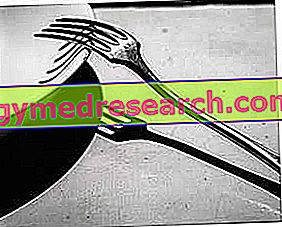Related articles: Pinguecola
Definition
A pinguecola is a benign lesion of the bulbar conjunctiva (mucous membrane that lines the eyeball and the inner part of the eyelids). This detected growth occurs on the area adjacent to the cornea, which is normally not involved.
The causes that promote the onset of a pinguecula are unknown, but it seems that its development may contribute to chronic exposure to irritating factors, such as sunlight, heat, dust, wind or extremely dry air.
Pinguecula is found predominantly in middle-aged or older people, but can also be observed in young people and children. Furthermore, subjects who spend a lot of time in the sun, without the protection of glasses or hats, have a greater risk of developing the disorder. Pinguecula is frequently associated with Gaucher disease.
Most common symptoms and signs *
- Burning eyes
- Conjunctivitis
- Ocular pain
- Eyelid swelling
- Eyes reddened
- itch
- Eye dryness
- Ocular secretion
- Blurred vision
Further indications
The pinguecula manifests itself as a thickening of conjunctival tissue of white-yellowish color, at the point of nasal or temporal union of the sclera and the cornea.
In some cases, the extreme dryness of the eye predisposes to an irritation of this lesion, which can predispose to symptoms such as foreign body sensation, redness, burning and itching. Other times, the lesion becomes swollen and becomes vascularized.
Over many years, pinguecula can increase its size. This growth does not affect visual function, but can cause ocular inflammation (pinguecolite).
In rare cases, the lesion can gradually extend over the cornea, leading to the formation of a pterygium (wedge-shaped outgrowth, which grows on the scleral conjunctiva and extends to invade the cornea).
In case of changes concerning the size, shape or color of the pinguecula, it is advisable to consult a doctor for a correct evaluation. An eye examination is often sufficient to diagnose this disorder.
In most cases, pinguecola does not require any kind of treatment, except in cases where these growths cause quite severe symptoms or represent an aesthetic problem.
The doctor can prescribe artificial tears for lubrication, while the temporary use of mild steroid eye drops may be useful to reduce inflammation. The surgical option is considered when a pinguecule becomes large enough to interfere with vision or is constantly inflamed.




